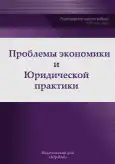On the issue of tactical management tools for modernization of companies in the real economy under the current anti-russian sanctions
- Authors: Moreva E.L.1, Abrosimova O.M.1
-
Affiliations:
- Financial University under the Government of the Russian Federation
- Issue: Vol 19, No 5 (2023)
- Pages: 179-187
- Section: Regional and Sectoral Economics
- URL: https://journals.eco-vector.com/2541-8025/article/view/626998
- DOI: https://doi.org/10.33693/2541-8025-2023-19-5-179-187
- EDN: https://elibrary.ru/WIPPQM
- ID: 626998
Cite item
Abstract
The purpose of the article is to work out recommendations on the use of tactical management tools for the modernization of the real economy in the context of sanctions pressure. Under these conditions, a special role is given to digital transformation technologies, which provide opportunities for the effective functioning of organizations in different sectors of the economy, including manufacturing industries. One of the key elements of tactical management of companies is the use of API (Application Programming Interface). APIs enable effective integration of various information systems and data exchange between them, which is an integral component of digital transformation. Also, feedback communication between companies and customers, partners and regulators play an important role in tactical management of modernization. Regular feedback allows the company's strategies and actions to be adapted according to the changing market situation. Feedback can be used to increase the innovation activity of organizations and stimulate modernization of manufacturing.
As a result of the study, the features of strategic and tactical management were identified based on the analysis of scientific Russian and foreign literature, recommendations on the use of API and feedback as means of tactical management in the real sector were substantiated.
Full Text
About the authors
Evgenia L. Moreva
Financial University under the Government of the Russian Federation
Author for correspondence.
Email: ELMoreva@fa.ru
ORCID iD: 0000-0001-6355-7808
Cand. Sci. (Econ.), Associate Professor, Deputy Director, Institute of Financial and Industrial Policy
Russian Federation, MoscowOlga M. Abrosimova
Financial University under the Government of the Russian Federation
Email: OMAbrosimova@fa.ru
ORCID iD: 0000-0002-8889-0989
Junior Researcher, Institute of Financial and Industrial Policy
Russian Federation, MoscowReferences
- Banmairuroy, W., Kritjaroen, T., & Homsombat, W. The effect of knowledge-oriented leadership and human resource development on sustainable competitive advantage through organizational innovation's component factors: Evidence from Thailand's new S-curve industries. Asia Pacific Management Review, 2022, 27(3), 200e209.
- Bodlaj, M., Kadic-Maglajlic, S., Vida, I. Disentangling the impact of different innovation types, financial constraints and geographic diversification on SMEs' export growth. Journal of Business Research, 2020, 108, 466e475.
- Chung H. F. L., Kuo T. When and how managerial ties matter in international competitive strategy, export financial and strategic performance framework: A standardized or customized approach? European Journal of Marketing, 2018, 52(1/2), 260e278.
- Chung H. F., Ho, M. H. W. International competitive strategies, organizational learning and export performance: A match and mis-match conceptualization. European Journal of Marketing, 2021, 55(1), 2794e2821.
- Defeo J. Juran's Quality Handbook: The Complete Guide to Performance Excellence. Seventh Edition, McGraw-Hill Education, 2016. —1200 p.
- Dekel-Dachs, O., Najda-Janoszka, M., Stokes, P., Simba, A., & Tarba, S. Searching for a new perspective on institutional voids, networks and the internationalisation of SMEs in emerging economies: A systematic literature review. International Marketing Review, 2021, 38, 879e899. doi: 10.1108/IMR-12-2020-0303.
- Drucker, Peter F. The Effective Executive. HarperCollins, 2006. 208 p.
- Dung, L. T., Giang, H. T. T. The effect of international intrapreneurship on firm export performance with driving force of organizational factors. Journal of Business & Industrial Marketing, 2021, 32, 1e20.
- Havranek, T., Horvath R., Zeynalov A. Natural Resources and Economic Growth: A Meta-analysis’, World Development. 2016, 88: 134–51.
- Rosnani S., Sa’adah H. Collaborative Feedback Approach for Improving Customer Engagement and Product Increment in Agile Software Development. IT in Industry, 2021, vol. 9, No.1.
- Yan, J., Tsinopoulos, C., & Xiong, Y. Unpacking the impact of innovation ambidexterity on export performance: Microfoundations and infrastructure investment. International Business Review, 2021, 30(1), Article 101766.
- Astakhova, U.V. Mechanism of strategic management of the socio-economic system of the country on the basis of risk management methods / U.V. Astakhova, E.E. Zhulanov // Bulletin of Perm National Research Polytechnic University. Socio-economic sciences. 2019. № 4. С. 174-190. doi: 10.15593/2224-9354/2019.3.14.
- Indicators of innovation activity: 2023 : statistical digest / V.V. Vlasova, L.M. Gokhberg, G.A. Gracheva, et al.; National Research University «Higher School of Economics». —M. : HSE, 2023. —292 p.
- Kleiner, G.B. System economy: steps of development: Monograph / G.B. Kleiner. Foreword by Academician V.L. Makarov. —Publishing House «Nauchnaja biblioteka», 2021. —746 p.
- Kuznetsov N.V. Approaches to the formation of the strategy of structural modernization of the Russian economy // Bulletin of the Altai Academy of Economics and Law. —2023. —№ 7-1. —С. 69–75.
Supplementary files











